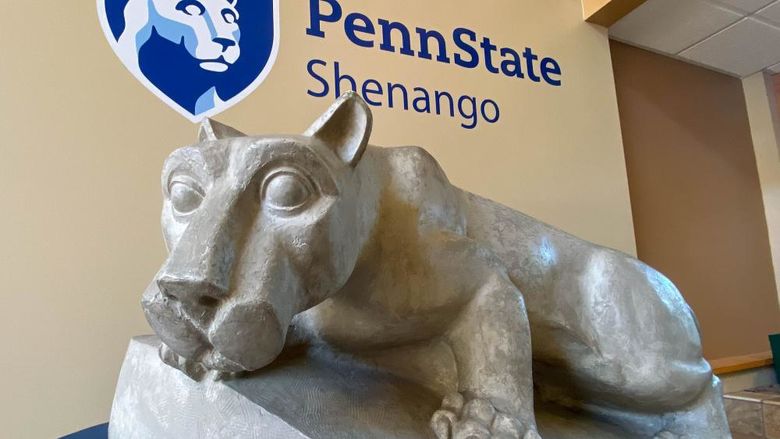
Physical therapist assistant graduate Alura Dillon enrolled in health policy and administration courses to broaden graduate study possibilities. (This image was taken prior to March 2020 and the enactment of protocols related to COVID-19.)
SHARON, Pa. — Penn State Shenango will launch four new majors to prepare students for local, state and national occupational demands. Corporate communications, criminal justice, cybersecurity analytics and operations, and health policy and administration will join Shenango’s offerings starting in fall 2021.
“These new majors complement Penn State Shenango’s existing business and health care offerings to empower students when choosing the program that best fits their strengths and interests,” said Campus Director Jo Anne Carrick.
Data from the U.S. Census Bureau reports health care, computer science and management occupations among the highest paid jobs in Mercer, Lawrence, Trumbull and Mahoning counties.
“Families know the importance of their children earning a degree, but many may be facing financial uncertainty right now,” said Director of Enrollment Chuck Greggs. “Penn State Shenango offers families an incredible value with lower tuition and our competitive ‘$3,000 for a 3.0 GPA’ scholarship program.”
Penn State’s application for fall 2021 is now open. For help applying or for more information about any majors, future students should contact the Admissions Office at shenango.psu.edu/admissions or by calling 724-983-2803.
Corporate communications
Penn State’s corporate communications program places an emphasis on humans and contemporary organizations. The program is well-suited for individuals looking to develop analytic, verbal and creative talents.
“Employers consistently report valuing communication skills like writing, speaking, presenting and effectively interacting with others,” said Tiffany Petricini, assistant teaching professor and corporate communications program coordinator. “This program is perfect for creative students with interests in written, visual and verbal communication. Successful communicators know how to design and time messages for their target audience.”
Communications courses focus on organizational communication, business writing, conflict resolution, negotiations, social media, public relations, marketing and crisis communications. Communications students will also gain journalism experience while working for the Shenango campus student newspaper.
The corporate communications program includes a semester-long internship to help students gain valuable experiences and jump-start the development of their professional network.
Criminal justice
The study of criminal justice is approached through an interdisciplinary lens, teaching students about the intersections of law, public policy and behavioral science in an effort to understand crime as a social problem and improve these systems for the good of society.
“In 2010 our campus launched the administration of justice degree, which is now officially named ‘criminal justice,’” said Carrick. “The name and curriculum changes to our existing major both enhances and modernizes the program.”
In addition to knowledge about criminal justice, the major cultivates skills in critical thinking, oral and written communication, issue analysis, and problem-solving. Graduates of this program are prepared to be adaptable and flexible, appreciate cultural diversity, and practice ethical behavior.
“Our program focuses on sharpening students’ talents of reasoning and judgement,” said Assistant Professor Travis Milburn. “Students participate in an internship to provide valuable experience as they prepare to be a criminal justice professional.”
The criminal justice degree program provides the groundwork for success in corrections, protective services, parole and probation, law enforcement, the court system, prevention and support resources, and graduate studies.
Cybersecurity analytics and operations
Companies and organizations around the world have a growing need for well-trained, qualified cybersecurity professionals. The cost of cybercrime is estimated to reach $6 trillion a year by 2021, according to Cybersecurity Ventures, with hackers hitting high-profile targets like Equifax, Target and the FBI.
Students will learn to analyze security issues from the perspective of human and information systems and how to anticipate and identify threats through the mastery of technology, articulate potential impacts to stakeholders, and ensure the safety of online information.
“Students typically enjoy working with and on computers, operating systems and applications,” said Matthew DeMaria, information technology instructor. “Graduates will enter the field with great salaries, flexibility and high levels of job satisfaction.”
According to the Bureau of Labor Statistics, the median annual salary for information security analysts was $99,730 in July of 2020. In addition, employment of information security analysts is projected to grow 32% through 2028, much faster than the average for all occupations.
Cybersecurity courses immerse students in programming and other technical areas, while also emphasizing the core competencies needed to communicate potential impacts to non-technical stakeholders. Students will complete an internship in the field, allowing them to apply what is learned in the classroom to real-world situations.
Health policy and administration
Now more than ever, the importance of quality health care access is a global focus. In response to this demand, the health policy and administration program will prepare students for management and policy positions in the health care field.
“I’ve always wanted to help people, so I started college in a health science major and realized it wasn’t the right fit for me,” said sophomore Kaitlyn Roseski. “I worked with advising to evaluate my interests, and we found that health policy and administration would be the perfect way to play into my strengths while still helping my community.”
The Bureau of Labor Statistics reports that medical and health service manager occupations are increasing much faster than average at a rate of 18% by 2028, creating a critical need for qualified professionals who can handle the management, business and policy aspects of the field.
Classes will allow students to specialize in health services management and health data analysis. Health services managers might manage a facility, department or program; while health analysts gather, compile and analyze data for health providers, payers and policymakers.
All health policy and administration students complete an internship in a health care setting, giving them valuable experience and contacts in the industry.
“If a student is excited by the health care industry but wants to work in an administrative or management roles, health policy and administration is a great major,” said Maureen Dunn, assistant teaching professor in nursing and health policy administration.
About Penn State Shenango
Penn State Shenango provides an affordable and accessible education, while prioritizing the academic quality and rigor expected at Penn State. The Shenango campus is located in Sharon, midway between Erie and Pittsburgh, near the Ohio border.
The Shenango campus offers 14 undergraduate degree programs to 400 students, in addition to a master of science in nursing. The campus also offers the first two years of study leading to more than 275 majors offered throughout the University — this path is called the 2+2 plan.
Brooke Doerfler
Strategic Communications Coordinator, Penn State Shenango





